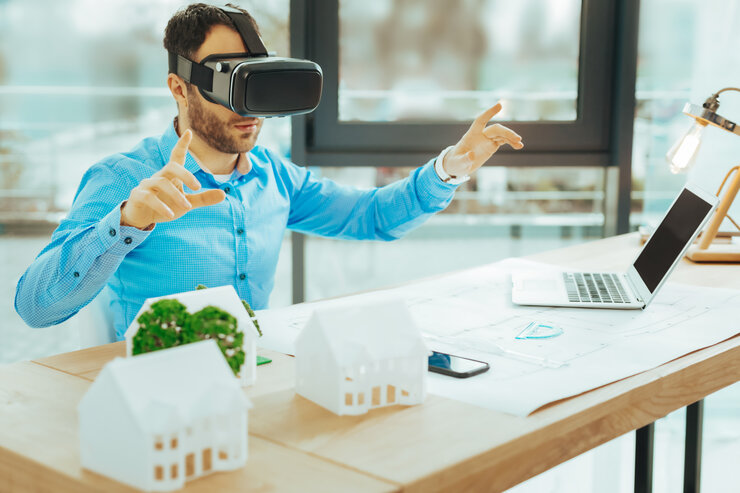You may not realize it, but the PropTech revolution is already well underway. Technology is used to buy and sell real estate and manage properties in ways that would have sounded like science fiction even a generation ago.
Websites like Property Finder and Dari have changed the way many people buy and sell real estate, but many more changes in the PropTech realm are coming and will be here sooner than many people realize.
Technology such as blockchain, Artificial Intelligence, augmented reality, and the Internet of Things will drastically change the future landscape of the real estate industry.
Internet of Things and Real Estate
The Internet of Things has already made a mark on the real estate industry, but many more innovations are in the works. Features such as smart doorbells and smart light switches have been installed in new construction for several years.
On the horizon are many more recent applications of this technology. Shortly m, any more unique IoT features will be less visible but perhaps add significantly more value. Home appliances in the future will be more energy efficient and perform better due to simple tech such as sensors connected to the Internet. Much more complex technology applications, such as predictive maintenance programs that schedule maintenance before a repair is needed, are also market ready. Most of the benefits will be realized without the homeowner needing to do anything.
Augmented and Virtual Reality are Changing the Way Real Estate is Sold
Virtual home showings became the norm during the pandemic lockdowns of 2020, but the groundwork was being laid years before. Technology now exists for property buyers to feel fully informed on the condition of a property without ever visiting it in person.
Matterport, for example, has allowed real estate agents always to have a perfectly staged home available for showing twenty-four hours a day for some time now. Still, it was seen as only a gimmick or with minimal use cases by most agents and consumers. After going mainstream in 2020, it is being widely adopted even now that in-person showings are safe to have again. In the future, look for virtual and augmented reality to become increasingly entrenched in the real estate industry.
Blockchain and Real Estate Transactions
Outside of gaming and digital art, blockchain has thus far failed to live up to its promise, but in the future, there are few places likely to be impacted by blockchain more than the real estate industry.
Looking forward to what is possible, documents associated with a real estate transaction could all be placed on the blockchain. Items such as profit and loss statements, deeds, and tax documents can all be listed, drastically cutting down on friction and other inefficiencies that can slow down the real estate transaction process.
Due to the trustless nature of NFTs, third parties such as title insurance companies and escrow providers may also become obsolete. The concept of “trustlessness” is a core element of blockchain, crypto payments, and smart contracts. “Trustless'' means there is no need to trust a third party, such as a bank, a person, or any other intermediary that could operate between the two parties involved in the transaction.
While we are still a long way from being able to conduct a real estate transaction entirely on blockchain, it does appear that more and more firms are embracing the possibility.
It is easy to imagine a system where all relevant property information is readily available and verifiably accurate on a twenty-four-hour basis. When a transaction does occur, all appropriate parties are instantly paid, such as brokers, agents, and attorneys.
A smart contract could even be written where a transaction does not occur until some contingency has been fulfilled. For example, as soon as a property inspector files a clean inspection report to the blockchain, the agreed-upon transaction immediately occurs.
While there are still many hurdles to leap to make blockchain transactions standard operating procedure, it does appear that many are embracing the possibility. As with all new technologies, there will always be some to resist change, but, likely, we will soon see many firms turn toward blockchain.
Big Data and Artificial Intelligence Will Change the Investing Landscape
One of the most critical ways PropTech will change the real estate industry is by incorporating big data and A.I. for real estate investors. Vast amounts of data are already available on most properties but sifting through it all in real time is cumbersome.
Applications are on the way that will use A.I. to sift through countless data points to analyze a property quickly. In a matter of seconds, algorithms can sort through millions of documents, examining photographs, home upgrades, current rental markets, debt levels, personal information about the homeowner, and prior transactions of similar properties and come up with an accurate valuation of the property. Investors will be able to predict their return on investment and perform much more accurate financial analysis than ever thought possible.
The PropTech revolution is already underway, although it is still early. In 2019, millions of dirhams of venture capital were invested into real estate technology startups, and the pandemic hastened the adoption of many new technologies. These numbers are only expected to increase as the UAE shifts further into embracing digital technology to create a robust flourishing economy for the betterment of its citizens’ quality of life.






















